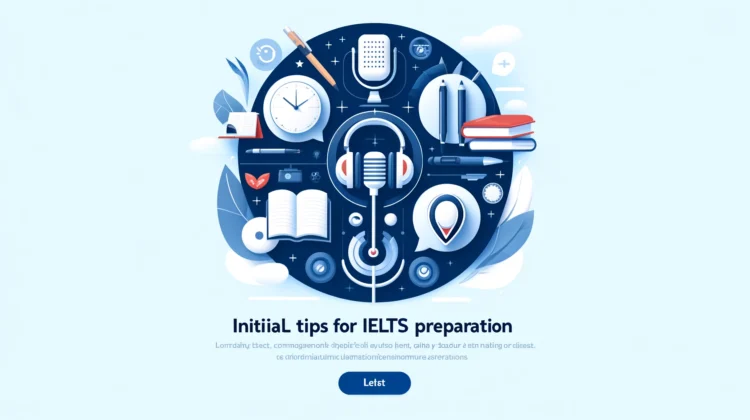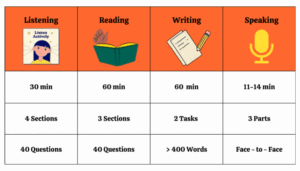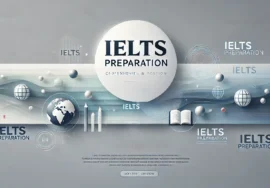
Initial Tips for IELTS Preparation
A comprehensive guide for IELTS preparation, offering initial tips and strategies for all four sections of the test. Learn how to assess your English level, set realistic goals, create a study plan, and practice effectively to achieve a high score in the IELTS exam.
Initial Tips for IELTS Preparation
Preparing for the IELTS (International English Language Testing System) exam can feel overwhelming at first, especially with its global importance and rigorous testing structure. However, with the right approach and mindset, you can prepare effectively and increase your chances of achieving a high score. Whether you’re a first-time test-taker or looking to improve your previous results, this guide will help you understand the essential steps to take when starting your IELTS preparation.
Understand the IELTS Test Format

The first step in your preparation is to familiarize yourself with the structure and content of the test. IELTS consists of four main sections:
- Listening (30 minutes): You will listen to a series of recordings and answer questions based on them. The recordings range from monologues to conversations and are designed to test your ability to understand different accents, tones, and speakers.
- Reading (60 minutes): The reading section has three parts with texts of increasing complexity. There are different versions of the reading test for Academic and General Training IELTS, so make sure you know which version applies to you.
- Writing (60 minutes): The writing section includes two tasks. Task 1 usually involves describing visual data or writing a letter (General Training), while Task 2 requires you to write an essay (both Academic and General Training).
- Speaking (11-14 minutes): This section is a face-to-face interview with an examiner. It includes three parts: an introduction, a longer speech on a given topic, and a discussion on a related topic.
Knowing the structure of each section will help you understand what to expect on exam day and how to manage your time during the test.
Assess Your Current Level of English

Before diving into preparation, take an honest look at your current level of English. Are you a beginner, intermediate, or advanced speaker? Identifying your strengths and weaknesses will guide your study plan. For example, if you struggle with listening, you can prioritize practicing listening exercises. On the other hand, if writing is your weak point, you can focus on developing your writing skills early in your preparation.
You can take a practice test or use free online resources to assess your level. Many websites and apps provide free practice tests that mimic the actual IELTS exam. This initial assessment will also give you a benchmark to track your progress throughout your preparation journey.
Set Realistic Goals and a Study Plan

A clear goal is crucial to stay motivated throughout your IELTS preparation. Consider the score you need for your specific purpose—whether it’s for university admission, immigration, or employment. Once you have your target score, break it down into smaller, manageable steps.
A study plan is key to organizing your preparation. Determine how much time you can dedicate each day or week to IELTS preparation, and create a schedule that aligns with your personal goals. Consistency is crucial, so make sure you follow the study plan diligently. For instance, you could allocate specific days to focus on each section of the exam:
- Mondays: Listening practice
- Tuesdays: Reading practice
- Wednesdays: Writing practice
- Thursdays: Speaking practice
- Fridays: Review and mock tests
Be sure to allocate time for breaks and relaxation to avoid burnout. Overworking can lead to fatigue and hinder your progress.
Focus on Each Section Individually
While preparing for the IELTS exam, it’s important to tackle each section separately. Here are some effective preparation strategies for each part:
Listening
- Listen to English-language podcasts, radio stations, and audiobooks to train your ears to different accents and speech patterns.
- Practice listening to different topics, including academic lectures, news reports, and conversations.
- Use official IELTS listening materials to familiarize yourself with the types of questions asked, including multiple choice, short answer, and sentence completion.
Reading
- Practice skimming and scanning techniques to quickly locate information within a text.
- Focus on reading a variety of texts, such as newspapers, academic articles, and magazines.
- Time yourself while practicing to simulate exam conditions, and try to answer questions within the allotted time frame.
- Take note of new vocabulary and try to incorporate it into your writing and speaking practice.
Writing
- Work on both writing tasks (Task 1 and Task 2) to improve your ability to present ideas clearly and logically.
- In Task 1, practice summarizing data, identifying trends, and organizing your writing in a coherent structure.
- For Task 2, practice writing essays on various topics. Focus on developing strong arguments and supporting your ideas with relevant examples.
- Get feedback on your writing from teachers, tutors, or fellow students to identify areas for improvement.
Speaking
- Practice speaking English every day, even if it’s just for a few minutes. The more you speak, the more confident you’ll become.
- Record yourself speaking and listen to the recordings to identify areas where you can improve, such as pronunciation or fluency.
- Join speaking clubs or find a language exchange partner to practice real-life conversations.
- Focus on speaking clearly and coherently. You don’t need to use complex vocabulary, but you should demonstrate your ability to communicate effectively.
Use Official IELTS Practice Materials
Using official IELTS practice materials is essential to prepare effectively. These materials are designed by the creators of the test and offer the most accurate representation of what you’ll encounter on exam day. Some popular resources include:
- The Official Cambridge Guide to IELTS
- IELTS Practice Tests by Cambridge
- IELTS Trainer
- The British Council and IDP websites for free sample questions and materials.
These resources will help you become familiar with the types of tasks, question formats, and timing in each section.
Practice Time Management
Time management is a critical skill for IELTS success. You have limited time for each section, and you must ensure that you can complete all questions without rushing. During practice tests, make sure to:
- Set a timer for each section to simulate exam conditions.
- Focus on accuracy but also aim to complete the test within the given time limit.
- If you find yourself struggling with time in any section, adjust your study plan to allocate more time to that particular area.
Prepare for the Speaking Test
The speaking section can be intimidating, especially since it involves direct interaction with an examiner. To perform well, practice is key. You should:
- Practice speaking about a variety of topics, such as your hobbies, interests, and daily routines.
- Record yourself speaking and review your pronunciation, grammar, and fluency.
- Familiarize yourself with the speaking test format by taking mock speaking tests.
Being able to speak confidently will give you an advantage, and you’ll feel more comfortable during the actual test.
Get Feedback and Monitor Progress
Getting feedback is one of the best ways to improve your performance. Whether from a teacher, a tutor, or a peer, constructive feedback will help you identify mistakes and correct them early on. Regularly review your progress and adjust your study plan if necessary.
Stay Motivated and Positive
IELTS preparation can be a long and challenging journey. It’s essential to stay motivated and maintain a positive mindset. Set small milestones, reward yourself for reaching them, and always keep your final goal in mind.
Don’t be discouraged by setbacks or mistakes—they are part of the learning process. Instead, use them as opportunities to improve.
Take Care of Yourself

Lastly, it’s important to take care of your mental and physical health during your IELTS preparation. Get plenty of sleep, eat nutritious meals, and exercise regularly to keep your energy levels high and your mind sharp.
Stress management is also crucial. Practice relaxation techniques such as deep breathing or meditation to stay calm and focused during your studies.
Conclusion
Effective IELTS preparation takes time, dedication, and strategy. By understanding the test format, setting clear goals, and practicing regularly, you can greatly improve your chances of achieving your desired score. Stay organized, focus on each section individually, and remember that consistency is the key to success. With the right mindset and preparation, you’ll be well on your way to acing the IELTS exam and reaching your academic or professional goals.








